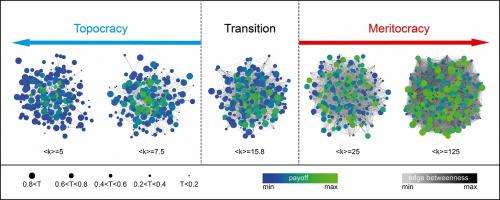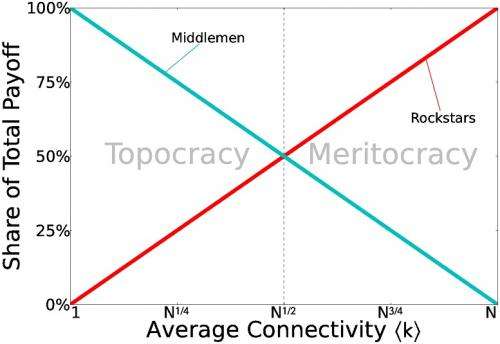January 21, 2014 report
Does the internet promote fairness of income distribution? (w/ Video)

(Phys.org) —The question of how an economic system should be structured in order to best promote fairness and equality is one of the most debated subjects of all time. By approaching the complexities of this question from the field of network science, researchers from MIT and other institutions have found that the average degree to which individuals in a society are connected to each other can crucially affect the fairness of income distribution.
The researchers, J. Borondo, et al., have published a paper on their research in a recent issue of Scientific Reports.
In their study, the researchers constructed a model in which individuals can earn income in two ways: by producing content or by distributing the content produced by others. A system in which more income is earned by production than by distribution is labeled as meritocratic, while one in which more income is earned by distribution is called topocratic. Importantly, the income earned by distribution depends not on what an individual produces but rather on an individual's position in the network.
Using this simple model, the researchers showed that the connectivity of the network determines whether the income is earned in a meritocratic or topocratic manner: densely connected networks are more meritocratic, while sparsely connected networks are more topocratic.
The difference makes sense, since individuals in densely connected networks can sell what they produce directly to others, and therefore do not need to share much of their proceedings with middlemen. On the other hand, in sparsely connected networks, individuals do not have direct connections with buyers and must rely on middlemen to help them connect.
Using analytical tools from network science, the researchers were able to calculate the threshold at which a topocracy transitions to a meritocracy. This threshold depends on both the connectivity of the network and the rule used to distribute the income between content producers and middlemen. When the income is shared evenly between a producer and the middlemen involved in a transaction, the transition occurs when the average path length between any two individuals is two. So if there is more than one person, on average, standing between a producer and her buyer, then the network becomes topocratic. In this model, the famous six degrees of separation implies a highly topocratic system.
When middlemen earn smaller percentages of the total sale, the threshold changes, following a power law whose exponent depends on the size of the commission. So when the middlemen's cut is smaller, less connectivity is required for the network to become meritocratic.

The results raise the question of how modern-day society is evolving in terms of networking. Due to advances in communication technologies and social networking sites, it's widely accepted that the connectivity of our society has been increasing. From the researchers' perspective, communications technologies are essentially reducing the cost of networking by making it easier for a person to directly interact with many other people, and hence, help make our society more meritocratic.
The model predicts that the internet, by giving individuals the ability to market directly to each other (or through one large mediator such as iTunes, Amazon, or eBay), is playing an important role in increasing the meritocracy of society by reducing the long chain of intermediations that define poorly connected societies. From this perspective, the internet seems to be promoting the fairness of income distribution in society.
Although the researchers see the meritocratic structure as favorable to the topocratic one, they caution that denser networks are not always preferable to sparser networks. For instance, sparser networks may better preserve cultural diversity and limit the spread of disease, among other benefits. In addition, previous research has shown that sparse networks prevent free-riders from prospering because of their limited direct connections. When free-riders must go through a middleman to exploit another individual, the middlemen may play the crucial role of enhancing cooperation.
More information: More information: J. Borondo, et al. "To Each According to its Degree: The Meritocracy and Topocracy of Embedded Markets." Scientific Reports. DOI: 10.1038/srep03784
Journal information: Scientific Reports
© 2014 Phys.org




















